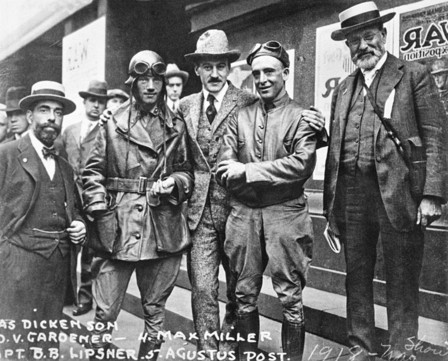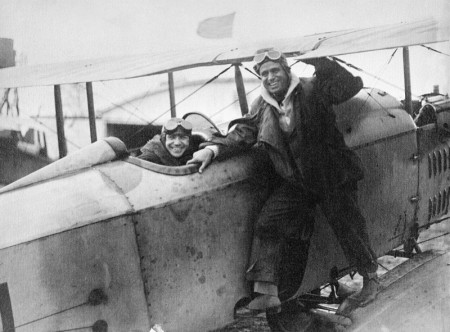
Set against the backdrop of the Jazz Age, with its glittery café society and Prohibition-era speakeasies, this action-packed adventure reveals the great heroics and desperate efforts involved in creating the world’s first airmail service. Leading the charge against a hostile Congress and ruthless railroad barons controlling the nation’s commerce is Otto Praeger, a tough-talking Texan and former newspaperman who bears a noble vision for what aviation could mean to the future of America.
Praeger is hard driven, passionate and defiant of the odds. To fly Uncle Sam’s mail, he chooses a team of like-minded zealots: racecar drivers, WWI pilots, and barnstormers. They are a brazen lot, dashing and headstrong, and always resentful of his authority.
Certain that the airplane can bring prosperity to the American people, and backed in that belief by the progressive Democratic administration of President Woodrow Wilson, Praeger proves himself the tenacious taskmaster, pushing men and machines to their limits. His “fly or be fired” dictum, regardless of the weather, leads to the deaths of one-quarter of all mail pilots. The job of flying the mail is so perilous that the media nicknames the U.S. Airmail “The Suicide Club”.
Personally conflicted by the deaths and the ramifications of his policies, Praeger nonetheless can’t afford to ease back on the throttle. He establishes a successful sky route between New York City, Philadelphia and Washington, D.C., but knows that success or failure of airmail rests on the ability to deliver the mail over longer distances and do it faster than the railroads. He pushes the service westward, connecting the East Coast with Cleveland, Chicago and St. Louis.
Despite his best efforts, airmail is in shambles three years after its inauguration. Public skepticism, hostility over the pilot deaths and huge cost overruns has the nation calling for its end. The service appears all but finished when the Republicans win the presidency in 1921. They waste no time in signaling their intention to cut all funding for airmail and give the money back to the railroads. A political appointee, Praeger is about to lose his job and also the fledgling service to which he has staked his career.
With airmail hanging in the balance, Praeger hatches a bold and desperate plan, the success of which will guarantee the future of the service—provided he could pull it off. A relay team of four pilots will fly the mail nonstop between New York to San Francisco, and do it in 36 hours instead of the usual 4 days it takes the railroad. That means, however, doing something that no sane person has ever attempted—flying in the total darkness of night.
The audacious plan quickly catches the imagination of the media, who whip the public into a frenzy of anticipation. In a rousing climax, thousands of people across the Midwest build bonfires to light the night sky, providing beacons for the pilots above.
Still, with one pilot killed on takeoff, and another two stopped by mechanical problems, it falls to one man—a soft-spoken cowboy named Jack Knight who has the blood of a homing pigeon in his veins—to see it through. Despite the overwhelming challenge, Knight survives the run, turning himself into an American icon and saving the airmail service in the process.
Veteran defense reporter Barry Rosenberg and columnist Catherine Macaulay have brilliantly combined the romance and danger of the dawn of flight in a dramatic story that captures the courage and daring of the near-mythic men and women who brought commercial aviation to America by flying the world’s first regularly scheduled airmail service.
We are excited about the commercial potential of MAVERICKS OF THE SKY as a feature film or documentary. It is a classic of its kind, an action-packed adventure that will captivate audiences with its glamour and energy, depicting, as it does, the quintessential American hero—whose dedication, hard work and perseverance brought to life a dream and changed the world for the better.
Below are some additional reasons why we believe MAVERICKS OF THE SKY will appeal to progressive-thinking actors and directors.
* In years past, government actually worked for the people it served. Never
was this more evident than roughly 90 years ago in l9l8 when the progressive Democratic administration of President Woodrow Wilson invested the equivalent of $1.5 million in today’s dollars into a new technology called the aeroplane. The president and his advisors believed these new, open cockpit biplanes could provide an invaluable benefit to the nation and its people. They would use them to fly the mail and, in doing so, they consciously set out to lay the groundwork for today’s global aviation
industry.
* Republicans in Congress called the venture "reckless" and did everything
in their power to kill it. The Wilson administration should get its head out
of the clouds and get down to "terra firma". Delivering letters by air was
nothing more than an expensive fad, they said, barely hiding the fact that
they were in the hip pocket of the railroad barons, who had the most to lose
from the airmail. If the people needed the airplane then the private sector
would develop it, they argued. But a number of visionary Progressives held
firm, convinced of the aeroplane’s future potential and believing it their
solemn duty as public servants to nurture emerging technologies.
* Despite the furor, the United States became the first country in the world
to start a regularly scheduled air mail service. Bucking public opinion and
facing congressional hostility, Postmaster General Albert Burleson (whose
grandfather fought alongside Sam Houston in the Mexican-American war) and his assistant Otto Praeger (the tough newspaper reporter who was the son of German immigrants) turned the post office into a flying laboratory—intent upon solving the problems of aviation.
* Flying Uncle Sam’s mail was both expensive and dangerous. One quarter of all the airmail pilots were killed during the first three years of operation.
Nicknamed "The Suicide Club" airmail pilots had only their wits and
instincts to keep them out of trouble. They were a dashing lot, brazen and
often resentful of authority. They were also determined to prove their
detractors wrong. Day after day, they climbed into their flimsy wood and
cloth-covered biplanes and moved the mail, eager to show that airplanes were more than just weapons of war.
* In the course of three short years, the men of the U.S. Postal Department
established a network of airmail routes that criss-crossed the country. In
underwriting airmail, the Wilson administration bucked convention and
invested in the future of America, creating the infrastructure for our
entire commercial aviation industry.
* This is an exciting and until-now untold story about a small group of
pilots and progressive politicians who were responsible for one of the
greatest successes in U.S. (and world) history.
Anyone interested in possibly optioning MAVERICKS OF THE SKY should contact our literary agent, Jane Dystel, or us. (Dystel & Goderich Literary Management, One Union Square West, Suite 904 New York, NY 10003 Phone: 212 627 9100 Fax: 212 627 9313, jane@dystel.com, or Miriam@dystel.com)
Mavericks of the Sky draws on exhaustive research of new archival material to bring forward this unforgettable story of adventure, heroism and suspense set against the threshold of the Jazz Age. It was a dangerous time for mail pilots; fully one-quarter of the pilots died while trying to push the limits of flight to the extreme. Yet, still they signed on in droves—these ex-barnstormers, racecar drivers and WWI flying aces who willingly risked their lives in order to continue their obsession with flying.
Nicknamed “The Suicide Club,” the men of the U.S. Air Mail Service were an amalgam of brazen, headstrong aviators bent on defying the odds. Climbing into their flimsy wood and cloth-covered biplanes they moved the mail through torrential rain and blinding snowstorms, relying on their wits and instincts to keep them out of trouble.
They were constantly driven by tough-talking Second Assistant Postmaster General Otto Praeger—a gritty newspaperman who along with his boss Albert Burleson, the tenacious postmaster general in the cabinet of President Woodrow Wilson, held a common faith in the future of aviation.
Despite the deaths, the public skepticism and the contempt in which Congress held airmail, Praeger and Burleson refused to give up. Day after day, they held to the same impossible conviction—that airmail could be reliable and eventually far superior to rail service. To prove their point, mail pilots were ordered to maintain strict timetables through the cruelest of weather conditions, creating a bitter clash of wills between postal officials and the group-proud pilots who chafed under their vice-like dictums and policies.
Yet together, this battling group of visionaries left behind an undeniable legacy, both to modern aviation and to the world. Just three years after the first inaugural flight, the U.S. Post Office Department succeeded in expanding airmail westward, ultimately connecting the entire county by air, from New York to San Francisco, establishing the first reliable application of powered flight for civilian use.
Rosenberg and Macaulay unfold the lives and exploits of these unlikely American heroes in a narrative that is as irresistibly fascinating as its subject—revealing the underpinnings of the American pioneer spirit.
Hardcover published by William Morrow, paperback published by Harper Perennial, with Kindle version also available.


